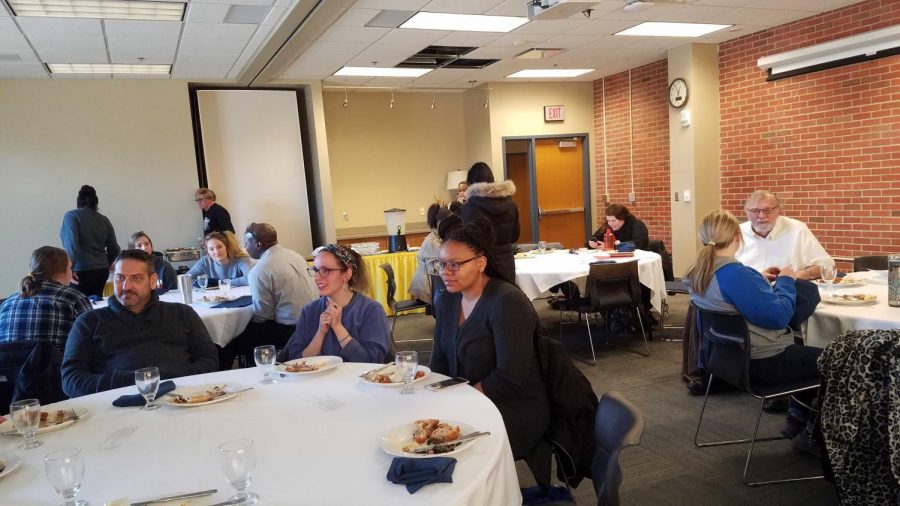Martin Luther King Jr. Week Celebrations Sparks Discussion
January 29, 2019
A speaker for Martin Luther King Jr. Week posed the question: would King have supported the Black Lives Matter movement.
According to Chike Akua, an author and a professor of educational leadership at Clark Atlanta University, King would have.
Akua gave a presentation called “Martin Luther King and the Call to Conscience” at 5 p.m. on Tuesday, Jan. 22.
Akua believes King would have wanted to work together with the Black Lives Matter (BLM) organization and that he would have treated the movement similarly to how he the Student Nonviolent Coordinating Committee (SNCC), a student-centric organization that advocated for the rights of African-Americans.
King did not always approve of the organization’s more violent or radical actions, but he still supported them when they needed help.
“Dr. King would look at BLM the same way as SNCC but would want them all to work together,” he said.
He also warned the audience against associating the Black Lives Matter hashtag with the Black Lives Matter organization.
“Activities of many of these people reflected back on the organization, and the actions may not be in line with the organization got lots of news coverage,” Akua said.
Unlike the Black Lives Matter organization, which advocates for “loving engagement” according to their values page on their website, the Black Lives Matter hashtag does not have a stated set of goals.
Akua wanted to bring to light what he believed were King’s more forgotten characteristics, which were character, consciousness and commitment.
“Dr. King is one of the few African American heroes,” Akua said. “I find that some of the most essential areas of his life are not exemplified [in public school curricula].”
Common Core standards require students to read King’s “A Letter from a Birmingham Jail,” but Akua feels that might not be enough.
Akua also thinks there have been other omissions in the teaching of African-American history in schools.
He argues that teaching of the 13th Amendment omits the second half of the amendment. The full amendment reads: “Neither slavery nor involuntary servitude, except as a punishment for crime whereof the party shall have been duly convicted, shall exist within the United States, or any place subject to their jurisdiction.”
The Common Core history and social studies book states that the “13th Amendment ended slavery,” but it does not mention the second portion of the amendment.
Akua gave the speech to enrich the audience’s understanding of the world around them, a characteristic he labels consciousness. He invited people to listen, whether they agree or disagree, and create a dialogue about the subject.
“The purpose of me being here today is not to make anyone feel bad,” Akua said. “It’s to make us open our minds to our prejudices.”
He also talked briefly about several African-American women, like Coretta Scott King, Ella Baker, Fannie Lou Hamer and Septima Clark, who he believes are often forgotten.
The Black Student Alliance and the Office of Multicultural Affairs sponsored a follow-up discussion at noon on Wednesday, Jan. 23. This event served King’s favorite meal, macaroni and cheese, collard greens, fried chicken, cornbread and desert.
Kendra Eichten, a graduate student in student affairs who works at the Office of Multicultural Center, believes that the week’s events can bring students new perspectives.
“It’s a good opportunity to talk about certain topics that people can be sensitive about,” Eichten said.
The discussion revolved around tackling racism and starting a nuanced dialogue.
About 30 staff, students and faculty attended the event, including English professor Paul Baggett.
“For me, how to talk about race without offending people, tensions are so high,” Baggett said. “We need to learn how to listen and be conscious of other perspectives. Self-awareness and humility come into this.”
Miranda McMullen, a senior pharmacy major, attended the event as part of the three cultural event requirements for pharmacy students. She thought this requirement could be valuable for students.
“It’s something we need to implement so we understand what is sensitive or offensive,” McMullen said. “We need to be more comfortable talking about it. How similar we are but we don’t talk about it because they don’t look like was or have a different accent.”
Other cultural events coming up include the Black Student Alliance 16th Annual Step Show on Feb. 2 and the series of films the Office of Multicultural Affairs and the Black Student Alliance will be sponsoring for Black History Month.






















